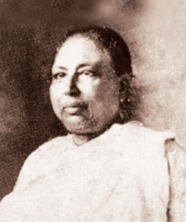Haimabati Sen
Haimabati Sen | |
|---|---|
 | |
| Born | Haimabati Ghosh 1866 Kulna district, East Bengal |
| Died | 1932 or 1933 |
| Other names | Haimabati Ghosh Mitra Sen |
| Occupation | Physician |
Haimabati Sen (1866 – 1932 or 1933), born Haimabati Ghosh, was an Indian physician.
Early life[]
Haimabati Ghosh was born in the Khulna district, East Bengal (now Bangladesh). Her father was a zamindar, a wealthy member of the Kulin Kayastha caste.[1] As a very young widow, she trained as a teacher in Benares. After her second marriage, she attended the Campbell Medical College in Calcutta,[2][3] and graduated at the top of her class in 1894.[4]
Career[]
Sen was a physician at the Lady Dufferin Women's Hospital in Hooghly from 1894 to 1910,[2][5] and had a private practice in Chinsurah, until her death in the early 1930s.[4] She wrote a "valuable"[1] memoir in the 1920s, detailing her own struggles and her concerns for all young women: "Do I have to suffer all this simply because I am a woman? Would anyone have inflicted so much suffering on a man? Why are they so worried as to whose wife I am or whose daughter?"[1] Her memoir was translated from Bengali and published in English many years later, in 2000.[6]
Personal life[]
Haimabati Ghosh married twice. She was first married at age 9, to a widower with two daughters; a year later, she was a child widow. Without the support of her husband, parents, brothers, or in-laws, she sought assistance at a widows' house in Benares, and joined the Brahmo Samaj community.[citation needed] In 1890, she married again, to Kunjabehari Sen. They had five children together. Haimabati Sen died in 1932 (or 1933),[7] in her sixties.[4]
References[]
- ^ Jump up to: a b c Sen, Indrani (2012). "Resisting Patriarchy: Complexities and Conflicts in the Memoir of Haimabati Sen". Economic and Political Weekly. 47 (12): 55–62, quotes from pages 55 and 57. ISSN 0012-9976. JSTOR 23214502.
- ^ Jump up to: a b Forbes, Geraldine Hancock (2005). Women in Colonial India: Essays on Politics, Medicine, and Historiography. Orient Blackswan. p. 146. ISBN 978-81-8028-017-7.
- ^ Mukherjee, Sujata (2017-01-05). Gender, Medicine, and Society in Colonial India: Women's Health Care in Nineteenth- and Early Twentieth-Century Bengal. Oxford University Press. doi:10.1093/acprof:oso/9780199468225.001.0001. ISBN 978-0-19-946822-5.
- ^ Jump up to: a b c Chattopadhyay, Anjana (2018). Women Scientists in India: Lives, Struggles & Achievements (PDF). National Book Trust, India. ISBN 978-81-237-8144-0.
- ^ "Book on India's premier women doctors". The Hans India. 2019-10-17. Retrieved 2020-10-19.
- ^ Sen, Haimabati (2000). The Memoirs of Dr. Haimabati Sen: From Child Widow to Lady Doctor. Roli Books. ISBN 978-81-7436-090-8.
- ^ "Haimabati Ghosh Mitra Sen". Oxford Reference. Retrieved 2020-10-19.
- Indian women medical doctors
- 19th-century Indian medical doctors
- People from Khulna District
- 1866 births
- 1930s deaths
- 20th-century Indian medical doctors